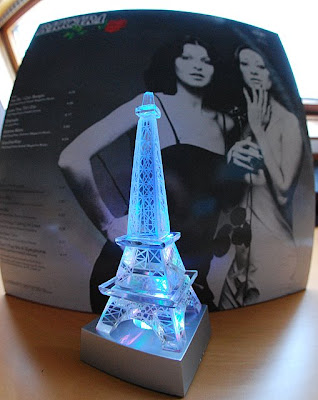

It's a good Dutch museum-season for people interested in polar (wild)life and Inuit culture. In Leiden the exposition
"The big thaw" is still running (when you haven't visited "The big thaw" yet: hurry - it's in the last month). And in July the
Museon in the Hague opened a new furnished Polar exposition room as part of its permanent exposition.

The Museon is the former "Municipal museum for education" in the Hague. Since the mid eighties it has become a popular scientific museum with a huge collection, covering subjects from geology, biology & environmental science, history & archaeology, physics & technology to cultural anthropology. The Museon has a lot of Inuit objects from Greenland, acquired by Nico Tinbergen around 1930. The new Polar room isn't very big, but attractive: a modern tasteful designed interactive multimedia presentation. For kayak enthusiasts: exposed are two kayaks from Greenland.

A small kid-sized one (with a mini Greenland-paddle and a cute little harpoon), and a very old greenland one decorated with Dutch West-Frisian (Hindelopen) paintwork. The latter is a bizarre object - some hybrid of Greenlandic and Dutch culture: in the 17th century Dutch whale hunters brought the kayak to the Netherlands and an anonymous painter decorated it in the 18th century with Dutch folk art. Presented are also some kayak-models, clothing and other hunting gear and there are also 2 videos about kayaking and hunting with a kayak.

Walking back to the station we discovered a giant iceberg floating in the Hofvijver, next tot the Netherlands Houses of Parliament. We first thought it would be part of some climate campaign of a NGO. But the object turned to be part of the exhibition
The Hague Sculpture.

Nearby at the Buitenhof is a giant sandsculpture to be found. It's made two months ago. Sun and rain have eroded the sculpture since, but it's still amazing intact.
Against the background of the skyline of The Hague in some scenes the theme ‘Den Haag, City of Peace and Justice’ is presented. The Skyline is a compilation of the known historical buildings in The Hague, complemented by the modern architecture of the (partly yet to build) new centre. Prominent in the foreground is the Peace Palace, as an international symbol of the City of Peace and Justice. End of august the remains - a mountain of sand - will be removed from the Buitenhof.











